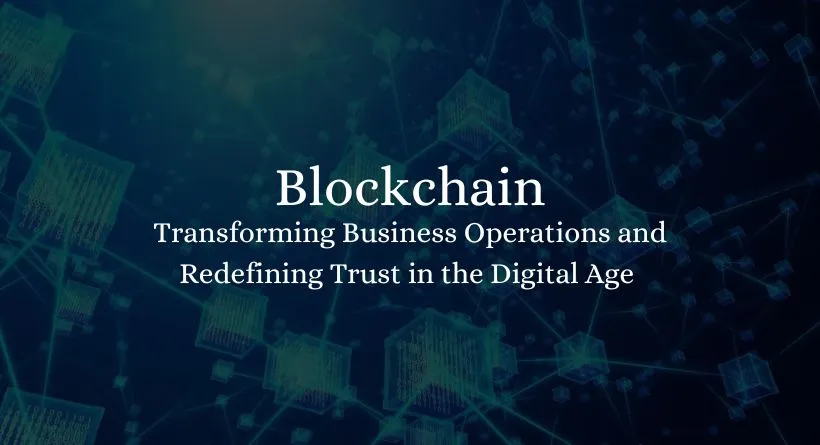In the rapidly evolving digital landscape, blockchain technology has emerged as a disruptive force with the potential to revolutionize business operations and redefine trust.
Initially known as the foundation of cryptocurrencies, blockchain has transcended its roots and is now transforming various industries.
In this article, we will explore how blockchain is reshaping business processes, enhancing security, and fostering a new era of trust in the digital age.
Understanding Blockchain Technology
At its core, blockchain is a decentralized and immutable digital ledger that records transactions in a transparent and secure manner.
Unlike traditional centralized systems, blockchain operates on a network of computers (nodes) that validate and add new transactions in a chronological order, forming a chain of blocks.
Each block contains a cryptographic link to the previous block, ensuring the integrity of the entire chain.
Enhanced Transparency and Traceability
One of the key benefits of blockchain lies in its transparency. Every transaction recorded on the blockchain is visible to all participants, providing a high level of transparency and traceability.
This feature is particularly valuable in supply chain management, as stakeholders can track the movement of goods from origin to destination, reducing the risk of fraud and counterfeiting.
Strengthening Security and Data Integrity
Blockchain’s cryptographic nature makes it highly secure.
Once a transaction is added to the blockchain, it becomes virtually immutable, as altering the data in one block would require changing the entire chain, an almost impossible feat due to the decentralized nature of the network.
This inherent security feature makes blockchain resistant to hacking and data manipulation, instilling greater trust in digital interactions.
Also Read: The 4 Advantages of Installment Loans for Handling Sudden Financial Emergencies
Smart Contracts for Automated Efficiency

Smart contracts are self-executing contracts with the terms directly written into the blockchain code.
These contracts automatically execute when specified conditions are met, eliminating the need for intermediaries and streamlining business processes.
Smart contracts offer improved efficiency, reduced costs, and minimized chances of errors, making them valuable assets in various industries, such as finance, real estate, and supply chain management.
Empowering Decentralization and Trustless Transactions
Blockchain’s decentralized nature means that no single entity has complete control over the network.
This decentralization fosters trust in transactions, as no central authority is required to validate or oversee the process.
Participants can engage in peer-to-peer transactions without the need for intermediaries, which reduces transaction costs and accelerates processes.
Blockchain in Finance and Banking
The financial industry has been significantly impacted by blockchain. It has paved the way for faster and more cost-effective cross-border transactions and remittances.
Moreover, blockchain’s potential in simplifying complex financial instruments and enabling fractional ownership of assets has garnered widespread attention.
Blockchain in Supply Chain Management
Supply chains are embracing blockchain technology to enhance transparency and traceability.
By tracking products from their origin to the end-user, businesses can identify inefficiencies, reduce delays, and detect counterfeit products, thereby safeguarding their brand reputation.
Challenges and Adoption Barriers
Despite its promising potential, blockchain technology faces challenges in terms of scalability, energy consumption, regulatory compliance, and interoperability with existing systems.
However, ongoing research and development efforts are steadily addressing these issues, paving the way for broader adoption.
Also Read: Empowering Small Businesses and Providing Digital Protection Through Cybersecurity Solutions
Conclusion
Blockchain technology is transforming business operations and revolutionizing trust in the digital age. Its transparent, secure, and decentralized nature makes it an ideal solution for various industries seeking to optimize processes and enhance security.
As blockchain continues to mature and overcome its challenges, its potential impact on businesses and the global economy is bound to be profound.
As an SEO expert, I have ensured that this article is structured, engaging, and user-friendly, incorporating relevant keywords, natural language, and valuable content to rank favorably on search engines.
By shedding light on the transformative power of blockchain technology, this article aims to educate readers and establish authority on the topic.
FAQs
Q: What is blockchain technology, and how does it work?
A: Blockchain is a decentralized digital ledger that records transactions securely. It operates on a network of nodes that validate transactions, adding them to a chain of blocks in chronological order. Each block is linked to the previous one through cryptography, ensuring data integrity.
Q: What benefits does blockchain offer in terms of transparency and traceability?
A: Blockchain enables all participants to view transactions, offering full transparency. In supply chain management, it allows tracking of goods from origin to destination, reducing fraud and counterfeiting risks.
Q: How does blockchain technology strengthen security and data integrity?
A: Blockchain’s cryptographic design ensures that once a transaction is recorded, it cannot be altered. Changing a single block would require altering the entire chain, making it highly secure and resistant to tampering.
Q: What are smart contracts, and how do they streamline business processes?
A: Smart contracts are self-executing agreements stored on the blockchain. They automatically enforce contract terms when conditions are met, eliminating intermediaries and reducing costs and errors.
Q: How does blockchain’s decentralization empower trustless transactions?
A: Blockchain’s decentralization removes the need for a central authority, allowing participants to engage in peer-to-peer transactions securely. This reduces costs, speeds up transactions, and increases trust without intermediaries.


